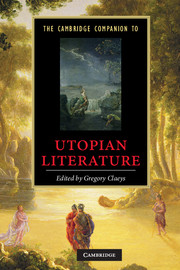Book contents
- Frontmatter
- Part I History
- 1 The concept of utopia
- 2 Thomas More’s Utopia: sources, legacy, and interpretation
- 3 Utopianism after More: the Renaissance and Enlightenment
- 4 Paradise transformed: varieties of nineteenth-century utopias
- 5 The origins of dystopia: Wells, Huxley and Orwell
- Part II Literature
- Further reading
- Index
3 - Utopianism after More: the Renaissance and Enlightenment
from Part I - History
Published online by Cambridge University Press: 28 September 2010
- Frontmatter
- Part I History
- 1 The concept of utopia
- 2 Thomas More’s Utopia: sources, legacy, and interpretation
- 3 Utopianism after More: the Renaissance and Enlightenment
- 4 Paradise transformed: varieties of nineteenth-century utopias
- 5 The origins of dystopia: Wells, Huxley and Orwell
- Part II Literature
- Further reading
- Index
Summary
A map of the world that does not include Utopia is not worth even glancing at, for it leaves out the one country at which Humanity is always landing. And when Humanity lands there, it looks out, and, seeing a better country, sets sail. Progress is the realisation of Utopias. (Oscar Wilde, The Soul of Man under Socialism, 1891) Oscar Wilde's poignant analysis suggests that three important aspects of Utopia are evident in the Renaissance and the Enlightenment. Firstly, Wilde recognizes the persistent ubiquity of utopian desire in human history. Utopia springs from the same impulse as the myth or the eschatological desire for a better afterlife and thus yearns to realize a condition of happiness, well-being and social harmony. Indeed, myths of the Island of the Blessed, the Land of Cockaygne, Elysium, Shangri-La and the Garden of Eden haunted philosophers, writers and travellers for centuries and paved the way for the geographical utopia of the Renaissance period and the voyage utopia of the eighteenth century which believed in the transformative quality of alterity. Wilde's aphorism also indicates that neither the genre's founder, Thomas More, nor seventeenth- and eighteenth-century followers could claim perfection and universality as invariable principles. What we therefore see, mostly later in the period, is recognition of the human restlessness that renders the classical idea of human nature and thus the ideal of static utopianism futile. Utopias are discourses on change itself rather than simply blueprints.
- Type
- Chapter
- Information
- The Cambridge Companion to Utopian Literature , pp. 51 - 78Publisher: Cambridge University PressPrint publication year: 2010
- 7
- Cited by

